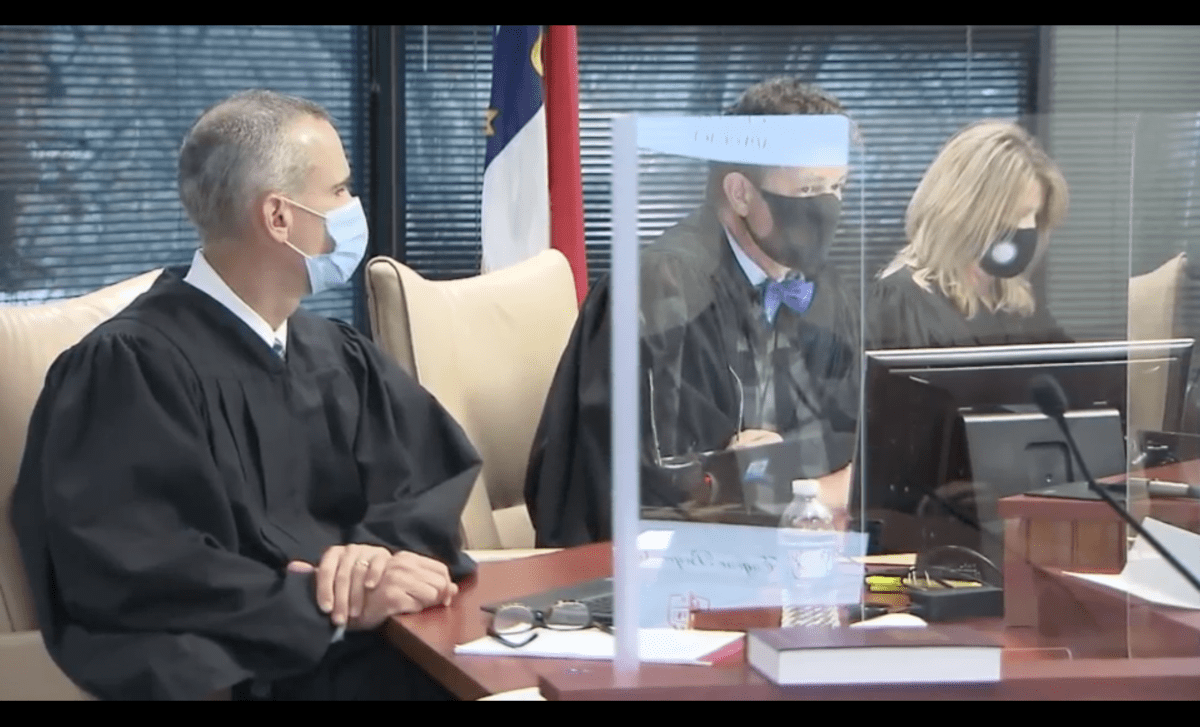
Reprinted from Carolina Public Press
A three-judge panel ruled against the challengers to North Carolina’s latest political maps, setting the stage for the N.C. Supreme Court to be the first appellate court in North Carolina to consider whether “extreme partisan gerrymandering” violates the state Constitution.
Supporter Spotlight
North Carolina’s political future rests heavily on the outcome of the case.
If the Supreme Court upholds the current maps, Republicans will very likely control the legislature for the next decade and help tip the balance in the U.S. House toward Republicans, even in elections where Democrats win upward of 55% of the statewide vote.
State lawmakers drew the maps after the latest census in a process that normally happens once a decade.
Three groups — N.C. League of Conservation Voters, the National Redistricting Foundation and the North Carolina chapter of Common Cause — filed suit against the state’s Republican legislative leadership and representatives who drew the maps.
The Superior Court judges, Graham Shirley II, a Republican of Wake County, Nathaniel Poovey, a Republican of Catawba County, and Dawn Layton, a Democrat of Anson County, acknowledged the influence of partisanship on the map-drawing process.
Supporter Spotlight
“This court has not been asked to eliminate all partisan gerrymandering, only ‘extreme’ partisan gerrymandering,” the order said. “In short, we are asked to decide how much partisanship is ‘extreme.’”
The 260-page order upheld the maps drawn to give a likely 10-4 advantage to Republicans in the U.S. House and similar advantages in the state legislature.
The judges said the maps are skewed with partisan intent to favor Republicans but that the courts do not have the power under the state Constitution to interfere in the map-drawing process, which the court called a political decision.
The court reached the same decision in the preliminary injunction state of the trial, leading to widespread anticipation of Tuesday’s outcome. But now that the ruling has been made, all three groups said they will appeal to the state Supreme Court, which is expected to hear the case in the next few weeks.
Each of the three groups of plaintiffs called the decision “disappointing” and “wrong.”
“If allowed to stand, these extreme gerrymanders would cause profound and lasting harm to the people of our state, especially hurting Black communities, by depriving voters of a voice in choosing their representatives,” said Bob Phillips, executive director of the North Carolina chapter of Common Cause, one of the plaintiffs.
N.C. House Speaker Tim Moore, R-Cleveland, one of the named defendants in the case, celebrated the ruling.
“I am pleased the trial court has ruled in our favor, upholding the maps drawn by the General Assembly in the most transparent process in North Carolina history,” Moore said.
Secret maps, partisan intent
During the trial, Rep. Destin Hall, R-Caldwell, said he drew the maps for the state House legislative districts using “concept maps,” or maps drawn by third parties, in creating the lines — a direct contradiction of his earlier statements.
He previously told Democratic lawmakers in October in the redistricting committee that he had not looked at any concept maps in drawing the legislative districts. At that point, he hadn’t, Hall said, but he started using them shortly thereafter.
But he again told Democratic lawmakers in November, during debates before Republicans passed the maps on a party-line vote, that he did not consult any concept maps. At that point, Hall had consulted the outside maps for about three weeks, according to his testimony during the January trial.
Attorneys for the plaintiffs asked for copies of the concept maps, but Hall said they have since been lost or destroyed. The failure to retain them could be a violation of state law.
A lawyer for the Common Cause plaintiffs, Allison Riggs, discovered the discrepancy during Hall’s deposition the week before the trial. She argued the maps could have used partisan and racial data, both of which were banned in the map-making process by the legislature’s own rules, but since they were destroyed there is no way to know.
The secret maps, misleading Democratic lawmakers and the maps’ destruction all pointed to intent, Riggs said.
In an earlier ruling, the trial court declined to impose sanctions for the failure to produce the maps, saying the assistant to Hall who had the maps is no longer a legislative employee.
What the ruling said
Relying heavily on historical analysis, the three-judge panel rejected the plaintiffs’ claims that the new maps violated state constitutional guarantees of free elections, equal protection, freedom of assembly and free speech.
The judges also condemned gerrymandering and its ill effect on the body politic but said the courts did not have the power to interfere.
“This court neither condones the enacted maps nor their anticipated potential results,” the order said.
“Despite our disdain for having to deal with issues that potentially lead to results incompatible with democratic principles and subject our state to ridicule, this court must remind itself that these maps are the result of a democratic process.”
Lawyers for the plaintiffs argued that the legislature drew the maps with partisan intent meant to discriminate against the political interests of Democrats and Black North Carolinians.
Intent is important, according to the trial court order, but there is a lack of racially motivated action in the current map-drawing process.
“Plaintiffs have shown, and the court agrees, that a substantial number of Black voters are affiliated with the Democratic Party,” the order read.
“What plaintiffs have not shown, however, is how the General Assembly targeted this group on the basis of race instead of partisanship. Black voters who also happen to be Democrats have therefore been grouped into the partisan intent of the General Assembly.”
During the trial, the plaintiffs’ academic experts in political science and mathematics testified that the Republican-drawn maps heavily favored Republican candidates.
If the maps were used, Republicans would essentially guarantee majority control over the state legislature, with a real chance at a veto-proof supermajority. Republicans would also send a disproportionate majority of the state’s representatives to the U.S. House, according to the expert testimony cited in the order.
While that outcome might be natural in a heavily Republican state, Republicans actually trail both Democrats and unaffiliated voters in registration in North Carolina.
Registration is no guarantee of voting habits, but recent statewide elections suggest the state is nearly evenly split between voters backing each party in a given race. In 2020, Democrats carried the governor’s race, but Republicans had a plurality victory for president in North Carolina, while eking out a narrow win for state Supreme Court Chief justice.
What’s next
The state Supreme Court did not set out a specific timeline for reviewing the case but required anyone wanting to appeal to do so in the next two days. The court said to expect expedited hearings.
Democrats occupy four seats of the state Supreme Court while Republicans hold three.
The plaintiffs asked Republican Justice Phil Berger Jr. to recuse himself from the case as Berger’s father is a named defendant and the Republican leader of the state Senate.
The defendants asked Democratic Justice Sam Ervin to recuse himself, as he is up for reelection this year and the decision he makes “may impact voter turnout or other factors of the general election,” according to the request.
Neither justice has yet responded. Their decisions over their own ability to rule impartially are final, according to a state Supreme Court order from Dec. 23.
Unless the justices decide to delay the state primaries yet again, they will need to make their ruling and finalize any new maps, if necessary, before Feb. 24, the date submitted by the State Board of Elections and ordered by the trial court to resume candidate filing.
The high court moved North Carolina’s 2022 primaries to May 17. Every state House and Senate seat is up for election, as are all 14 seats for the U.S. House of Representatives.
Coastal Review is partnering with Carolina Public Press to provide readers with more stories relevant to the coast.







